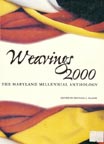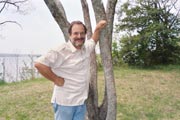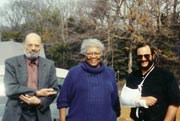 |
||||||||
|
Volume 12, Issue 33 ~ August 12 -18, 2004
|
||||||||
Back in the early 1700s, a young and feisty English merchant named Ebenezer Cook who published an acidic account of his visit to colonial Maryland named himself Maryland’s first poet laureate. Bay Weekly Becoming a poet isn’t on the list of occupations usually suggested to young people. How did you decide to become a poet?
Michael Glaser There are many roles. One is to remind us of our human generosity and frailty. To remind us that our spiritual and emotional lives matter — and perhaps matter more importantly than the work-oriented aspects of our lives. The artist reminds us that love matters. When we take time to experience art, we take time to remember that. A Blessing for Children Blessed be our children who take us out of ourselves, who teach us even as they grow from us. —Greatest Hits: 1975-2000 Bay Weekly Could poets bring something to the concern and action for the health of Chesapeake Bay? Michael Glaser Yes. The arts can help people make connections. Somebody was telling me yesterday about how many people can’t see the connection between our lives and the Chesapeake Bay. I thought, What if, for a day, we just could plug up all those water-connections? Plug up every place where waste is being poured into the Bay? Plug up every place where we’re taking water out? Stop the taking of seafood out of the Bay? We’d be in trouble.  I am witnessing the desecration of the shoreline I am witnessing the desecration of the shorelinethe Army Corps of Engineers was sent to save. Jobs for the Corps, and for the wealthy, more shore — ringed with rock to keep the waves and common folk off. … more and more to protect the shore from storm and tides and winds that blow as if we could somehow stop the breathing, the ebb and rise of nature’s constant flow. —Water From the positive side, I think the Calvert seahorses displayed around the county are terrific. They remind people how beautiful these creatures are. They might lead us to ask What are we rushing for? Where are we going? What are we leaving behind for our grandchildren? Bay Weekly The seahorses were painted by school children. Do you think the message is special because it’s from children? Michael Glaser I agree with Tom Wisner that children are more able to understand the connection between the natural world and their own lives than adults who haven’t thought about it. So they’re reminders. In our busyness, we can forget our responsibility to our children, the legacy we’re leaving behind environmentally and socially. The seahorses are dependent on the sea grasses, which are dependent on what we humans do, interfering with the Bay’s own ability to nurture itself. Bay Weekly Do you hope to evoke more poetry in the schools? Michael Glaser Part of what’s important is to get children to write. But it’s also important to share with children the wonderful poems that already exist. There are many fine, fine poems that elementary school children can read. I think poetry has been made difficult. A lot of poems say what they say with easy readability. We can find strength in our humanity by reading poetry that honors who we are. In my poetry, I celebrate my back yard, seahorses, the beach I go to in the summer, my mother, my dog, my kids. This is who I am. For students, it can be recognizing that I’m someone who likes to sit alone at night and stare at the stars and wonder what it’s all about. Or I’m somebody who’s in love with a girl who doesn’t even recognize me. A Blessing for the Woods Let me stop to say a blessing for the woods: for crows barking and squirrels scampering, for trees and fungus and multi- colored leaves, for the way sunlight laces shadows through each branch and leaf of tree, for these paths that take me in for these paths that lead me out. —Christian Science Monitor & Greatest Hits 1975-2000 Bay Weekly After 34 years of teaching, with multiple terms as department chair and division head, you’re still highly energized. Has poetry helped you sustain your interest in teaching and in life? Michael Glaser When you’re young and go to college, you keep trying to find all the answers. Then, at some point in time, you realize that there aren’t final answers. The great joy of always learning is deeper perception of life, of human relationships, of how and why things change. Our challenge, it seems to me, is to walk the walk of peace, positive energy, and to put that energy into the world. I don’t see bitter people accomplishing much. Bay Weekly What poets do you read? Michael Glaser I treasure [Pulitzer Prize winner] Mary Oliver’s work. T.S. Eliot’s Four Quartets enriches me over and over again. I’ve been reading Hafiz and Rumi, the Sufi poets, with appreciation for the gentle humor and spirituality of their work. Galway Kinnell has always been a favorite poet. Children poets in the school astonish me. There are hundreds of thousands of people writing excellent poems who just aren’t known. Bay Weekly If people feel a lack of community around them, would gathering poetry and sharing it be a way to build a community? Michael Glaser There’s a line from Harvard philosopher Josiah Royce that says: If you can’t find the beloved community, create it! The person that brought me that quote was Charlie Hewitt. He was then head of the St. Mary’s Arts Council and a wonderful artist. He really did create community through the arts council. He encouraged me to do that and to pick up on the Ebenezer Cooke poetry festival. To create a place where poets feel welcome is valuable. It’s essential to value differences. There is no single right way to live. If we can honor how astonishing it is that each person does things in his or her own way, then what a wonderful world it can be.  It took three years to teach my son It took three years to teach my sonnot to say that things or people were weird. “Unusual, Daniel, or different,” I’d repeat over and over to his 9 then 10, then 11 year ears. Trying as best I could to help him value differences … —A Lover’s Eye
Michael Glaser My wife, Kathy; my children, my students; the opportunity to be teaching for almost 40 years now. Students keep you alive. There are also gentle kinds of things, opportunities that different people created for me. My being able to take over the Oxford Program at St. Mary’s College opened travel for me and the opportunity to experience different cultures and meet new people. I treasure people who have passion in their lives. There have been so many people whose work I read. I took encouragement, for example, from Martin Luther King’s statement that “I cannot stand in your place and you cannot stand in mine. But there is nothing to stop us from shouting encouragement to each other!” Bay Weekly You’re known for your May literary festivals and workshops. Are they an influence on you? Michael Glaser Having two weeks to do nothing but writing, in a community of writers that you’re involved with: Yes, that has been very helpful. On weekends, for example, we begin the day with morning poems — a shared wake-up. It’s a lovely meditative way to enter into the day. In the workshops, people discuss their writing. We do exercises that lead to poems. We connect to the other arts, especially music, in the evening events. For me, it comes down to what I call the important things: love and community, celebrating our uniqueness as human beings. Art is about that. It asks us: “What are you doing with your life?” Mary Oliver’s poem that ends with the line —Tell me, what are you going to do with one wild and precious life? — says it all. The job of the poet is to ask that question, not to answer it. Bay Weekly Is there a poem growing about becoming poet laureate? Michael Glaser Indeed. I have the first lines: On my first day of being poet laureate, the stock market fell 56 points. I am truly grateful for the opportunity to be a more vocal advocate for the quality of life and spirit that poetry can bring to our world. p Michael Glaser can be reached at [email protected].
|
||||||||
|
© COPYRIGHT 2004 by New Bay Enterprises, Inc. All rights reserved. |


 Arm
Arm onoring in our culture. It evokes a sharing of our humanness.
onoring in our culture. It evokes a sharing of our humanness.
